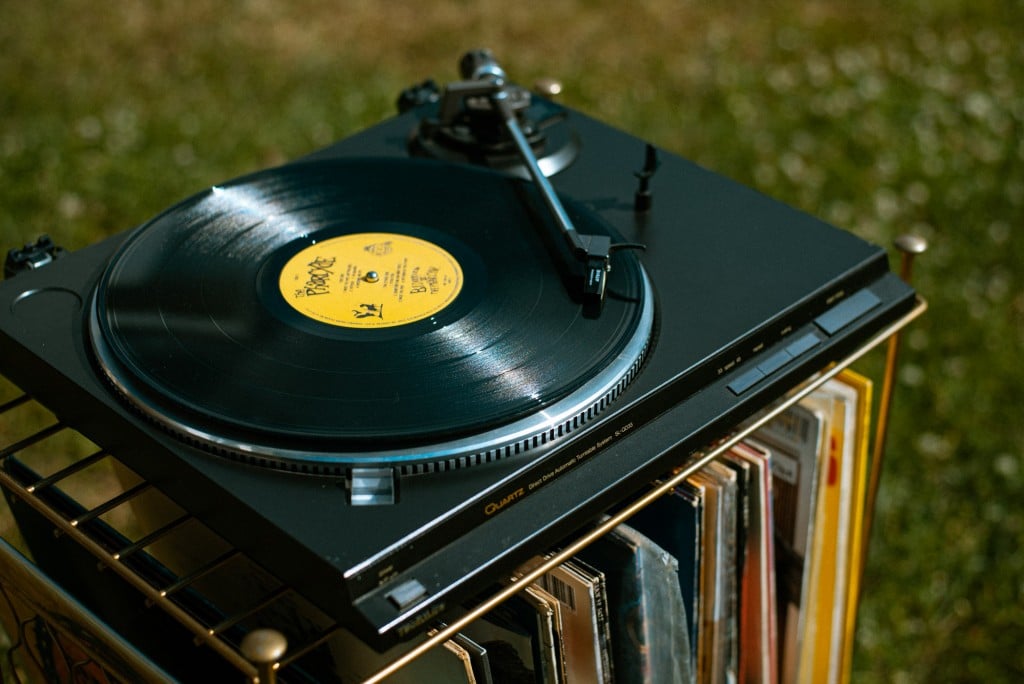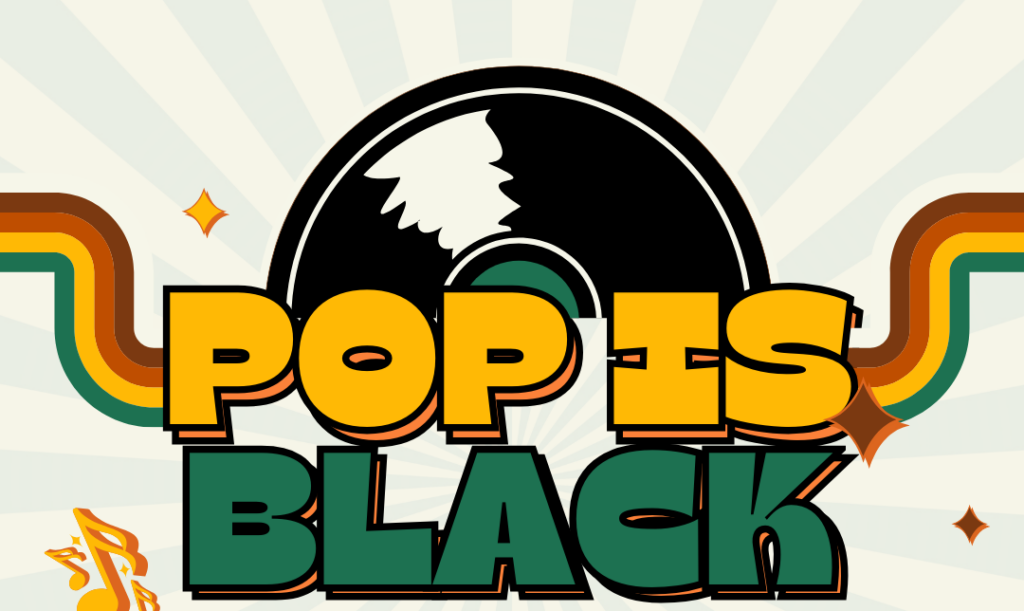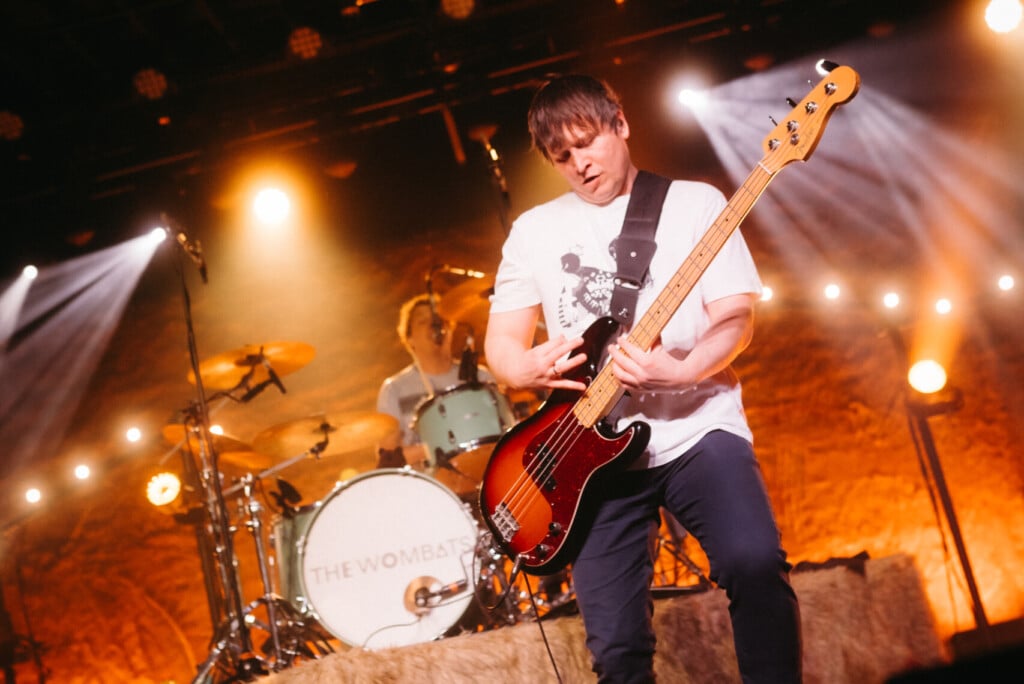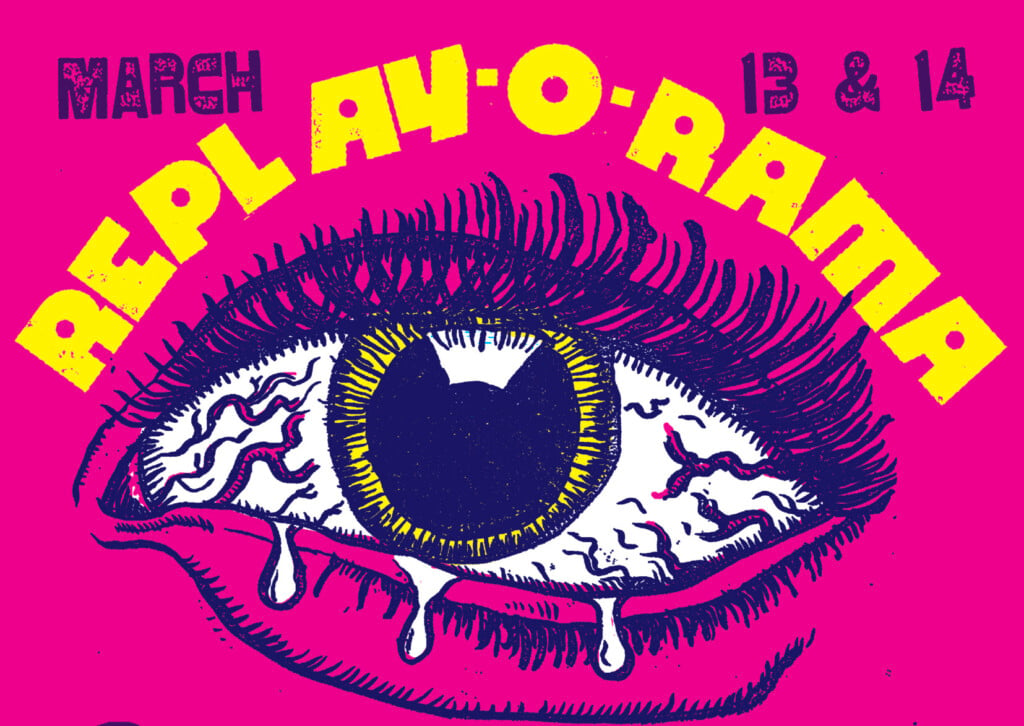Steve Tulipana talks Play Loud Festival, reflects on 20 loud years of recordBar
For two decades, recordBar has been a steady rhythm in Kansas City’s live music scene as a space where underground artists and international names alike have shared the stage in the city’s own backyard. Since 2005, the venue has evolved from a humble neighborhood hangout into a sought-out midsize stage known for its artist-first values.
As recordBar hits its 20-year milestone this month, founders Steven Tulipana and Shawn Sherrill are celebrating big with the inaugural Play Loud Festival, a multivenue blowout bringing together old favorites, local legends, and longtime friends of the bar. The festival is a tribute to the community that’s kept the place humming all these years, and you’d probably be crazy to miss it.
Tulipana sat down with The Pitch to chat about recordBar’s unexpected evolution, what’s next for the space, and the philosophy that’s kept it alive all these years.
The Pitch: recordBar is celebrating its 20th anniversary here pretty soon. What’s it mean to you that the location has reached this milestone?
Steve Tulipana: It’s wild to me. It’s a pretty big deal. When we opened recordBar, my partner, Shawn Sherrill, and I both were touring musicians, and we kind of modeled what we do off of the clubs we liked around the country that we played at. Places like 7th St. Entry, First Avenue Minneapolis, the Metro in Chicago, the Empty Bottle in Chicago was a big influence just how those places treated their artists and how they did things very transparently and efficiently. I looked at those places like they were iconic. I never thought recorderBar would be on that list, like the venues around the country that you go to that artists make sure they put on their routing, and we’re very proud of it.
You guys are celebrating the milestone with the Play Loud Festival. What’s that going to look like?
The plan is that it will be like a street festival on Grand. We’ll have a large stage out there on Grand, blocked off between 15th and 16th Street, and we’ll have a big video wall, a professional, cool looking stage. We’re excited about it. We have a few touring and international artists, but really we wanted to kind of honor what made recordBar last 20 years, which was really a lot of our local music scene that we love, so we have some reunions from some bands that played at the old location and the new location.
We have some stuff we haven’t even announced yet, but there’ll be the stage on Grand and we will have bands inside at recordBar. We will have DJs and electronic artists over at Kobi Q, and then we’re going to do some special VIP, limited ticket events with some pretty well known artists locally that we haven’t announced yet, but that they’ll be at The Wolf Den, which is the new space below The Belfry, brought to us by Chef Celina Tio. We’re going to kind of announce add ons to the festival ticket over the next couple weeks, and if you buy the ultra VIP ticket, you can get into all of the events quicker; get you invited to all the specialty events that we’re planning.
How did you go about picking bands? What features of a band did you look for as who you wanted to be on stage?
We had a wish list that was pretty wishy. We’ve had, over the years, some artists that went on to be very successful grace our stage, like The National and St. Vincent, Mumford and Sons, Billie Eilish even played our room. We kind of were hoping that we could get to some of those people and see if they would want to, kind of like ‘Yeah, you played our stage to 20 people,’ and we couldn’t really get any of that to pan out. We tried hard, but that just doesn’t always work out. I understand, but you can always dream and you never know. But Deerhoof is playing. We’re big fans of them, and they have played the room before. They’re headlining Saturday night, and then we just kind of looked at bands that have played in the room before, and talked about old friends that had bands that started in the room, and Making Movies played one of their first shows ever at recordBar. They’ll be headlining Friday night. They were fresh out of high school, I think, when they played there, if not, one of them still might have been in high school.
We looked at it like ‘Who’s been involved with the history of the bar?’ That’s what we want to kind of honor the whole 20 years. We have a few more artists to announce that are just getting confirmed. It’s like constantly changing every day, and we’ve been planning it for a long time, but it’s crazy how these things sometimes just come together at the last minute.
You’ve been a part of several bands over the years and have subbed into several performances, so will you be making any appearances on stage?
My partner Shawn and I were involved in a band called The Roman Numerals that hasn’t really been active for a while. We really started that band at the same time as recordBar. The week we signed our lease and opened recordBar, we were in Chicago recording our album, and then we toured quite a bit of those first few years while we were open, so that band is going to play on Saturday night, and it’s actually going to be the last band to finish outside, and then we’ll start inside. But other than that, not too much. I’m still pretty active in a bunch of bands, but I wouldn’t say I fill in, but I play different stuff.
When recordBar opened up 20 years ago, what did you initially envision the venue would become, compared to how it actually turned out?
When we first started, Shawn and I, we had toured all over the country and seen all these music venues, and at the time, I was a bartender at a place called The Hurricane, which became The Riot Room, and Shawn, when I was touring, Shawn and I also DJed around town and whatever. Shawn was a bar manager in fine dining, worked at JJ’s for a long time, and we were always like, ‘Someday we’ll have our own club, like we come out from tour, we just go work at our club, not other people’s.’ We talked about that for quite a few years and an opportunity happened, but it was the original venue, which if you’re not familiar, was in the old Westport Shopping Center, where, I think it’s a Nature’s Own grocery store now, and before us, it was an Irish Pub, and we knew the guys that owned it.
Our original attitude was to be something more like miniBar: very small and the plan wasn’t to do live music all the time, just to do it every now and then, maybe a couple times a month. We had a few shows early on when we opened, and they were just so successful. People were just like, ‘Why don’t we do this?’ And Jacki Becker, who has up to 11 productions out of Lawrence, she was a friend, and she was like, ‘We need another venue in Kansas City. Why don’t you do this?’ So she brought us The National the first time, and it was so successful, and we just kept building it and building it really. So originally, I think we thought it would be more of like a pub with food and trivia and karaoke and things like that, but it just kind of expanded. Especially when we lost the lease over there, moving downtown, we had really found our, you know, after 11 years, found our footing. We were going to be a venue more than a restaurant or anything else.
Since the pandemic, and even before that, attendance and bands actually touring in Kansas City have been in flux, so what’s it been like navigating all of those variables over the years as a midsized venue?
I think it’s always been like that, even well before. Things ebb and flow with the industry,and they ebb and flow with the economy. We’re kind of like coming from more of a punk rock DIY mentality. Maybe punk rock isn’t the right word, but you kind of have to know how to do everything, and you do be a scrimp, and you don’t get paid a lot, and you try to keep it fun, you know. I think that’s how we’ve managed to just kind of ride the wave the best we can. It’s been pretty scary a few times, but we also have really great support. The local music scene and people, we’ve just been really lucky to have such a tight knit scene and people support things even when sometimes it’s hard to support things because of the economy or whatever else.
The Kansas City Royals have been reviewing locations to move their stadium and recordBar fell close to the area where they were looking to build and KC is still looking to revitalize ahead of the World Cup next year, so what’s been the pressure of existing on this sort of chopping block?
We weren’t really on the chopping block when they wanted to do the stadium over there. I mean, it was directly across the street. It was our front door. Our building would have existed, it was across the street, but we have several friends that own property in the chopping block zone, so we are very supportive of them. We just didn’t think it was the right spot for it. I still think a downtown stadium would be nice, but I think there’s better places for it. We weren’t anti-Royals at all. We were just anti that space, and anti the tax to pay for it, so we really lobbied hard on that, and we won that battle. I just don’t think they gave enough lead time and talked to enough people about that, and then it was just kind of strange how they tried to push that through, and it proved the public didn’t care for that.
Did the Royals work with you at all? Did they talk to people in the area? How did they go about that?
They did eventually. Like I said, our building was not in the chopping zone, so they never made us an offer or anything. They were just like, ‘Make sure that there’s parking,’ but it was nothing direct. It’s usually through the Crossroads Association, so we never had any good discussions with them directly. It is what it is, but with sports, I think it’s great we got the World Cup, but I also have to be candid. The Draft was supposed to be this great thing for all the bars and restaurants in town, and it just ruined our business because everyone heard it was going to be crazy busy, and your locals didn’t want to mess with it, so they just stayed home and then we had no business.
We’ve also heard some rumors that you guys have been exploring building a recording studio in the basement. Is there type of validity to that, or is that just talk?
That’s just talk. We have a little area that we’re trying to build out, kind of more of a little video studio for doing marketing and doing for videos and things like that, for marketing for shows and stuff that’s kind of been getting set up. We could maybe add some kind of recording aspect, but we haven’t. It’s low on the list right now. We want to get through this festival. The building currently has the space, though. We have a new landlord who has been doing some renovations upstairs. We’re the only tenant in the building right now, so we’re kind of waiting to hear what his plans are.
So with that potential space at your disposal, what do you think recordBar will look like within five or 10 years?
After five or 10 years, I see two things. I don’t know that we have room to expand much, just because of the nature of what the building is. We stopped our food program during the pandemic, and we haven’t rebooted that, but that is high on our list to get our kitchen going back again. There’s a couple of things that I’d like to do personally. There might be a few things we could do to increase capacity, but not that we really want to increase it that much. I think we’re kind of in a sweet spot for up and coming bands and local artists and some bigger bands, but we’re kind of right at that point where you can still see a band that’s on their way up. It’s going to be big and you can still be like right there and feel like it’s intimate, and that’s something I’ve always loved, and I think it’s really key to recordBar’s success. Once you go beyond that, to me, it’s just more of a job. It’s really more about capitalism at that point. It always is to some degree, but once you get above that; once it becomes not intimate and just becomes about selling tickets, it doesn’t feel personal, which is something I really care about. How I grew up with music and got connected to underground music, that’s really important to me.
So you’re more comfortable with staying a smaller venue rather than a larger one?
That’s how I like to just connect with music and see it. There’s nothing wrong with it. I’m just saying I think we’re in a sweet spot. For me, we’ve had recordBar for 20 years, but I booked my first show when I was 19 years old, and it was like 1988, it was L7 and Bad Religion at a little warehouse base on 47th and Troost that is no longer there where my buddies used to throw underground, DIY, all ages shows. Bad Religion did not show up, but L7 did. It was our first time in Kansas City. I’ve just been doing it a long time and then on top of that, playing in bands, touring for what’s that, 35 years?
With 20 years of recordBar behind you, and hopefully a lot to go, what kind of legacy are you guys hoping to imprint on Kansas City?
Well, in my mind, I want it to be the Empty Bottle of Kansas City, or the CBGBs of Kansas City, or whatever. It’s not as punk as all that, but, but the span of time that those venues have been around, and what they did with introducing people to new artists and helping nurture creativity and bringing up artists from their beginning to be too big to play there. I think that’s cool. I love that. That makes us proud. Like, yep, we were there at the beginning. That’s kind of how I see it. I’d love for people to think it was that.
I also think that I would love to see recordBar beyond me being actively involved with it. I’m getting to that age where I’m like, ‘What’s it look like without me?’ Well, hopefully it looks even better. I mean, I’ve already brought in some different people to help us make it go and new ideas and younger ideas, and things are always changing, so we don’t really want to be gatekeepers by any means. I think sometimes people think you are because they’re like, ‘Why can’t I get a show there?’ But it’s not that, you know. That is based on the calendar, and sometimes based on, not just my decision, but multiple people’s decisions of whether or not someone’s ready to play the room, you know? But we never shut people down. We’ve always had openness to new things.






